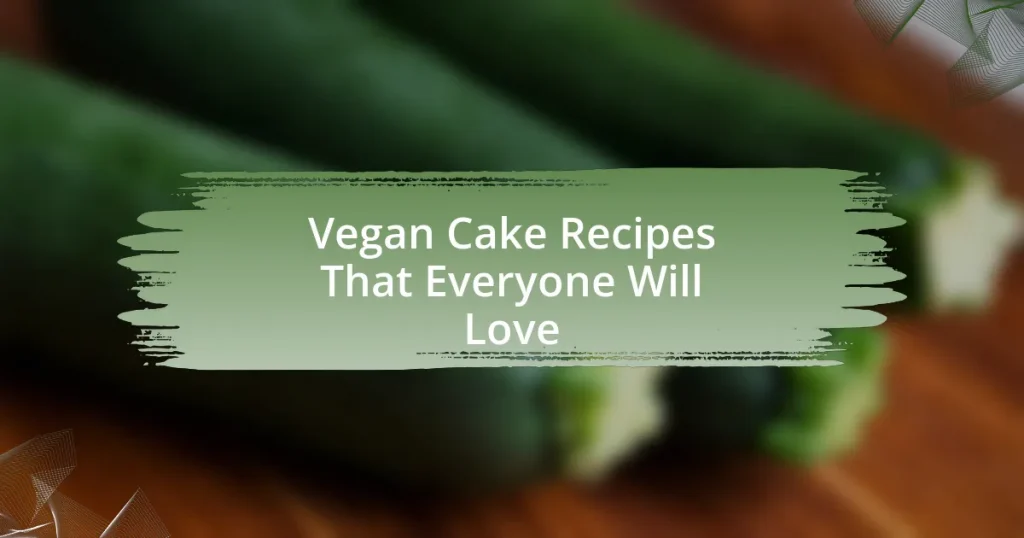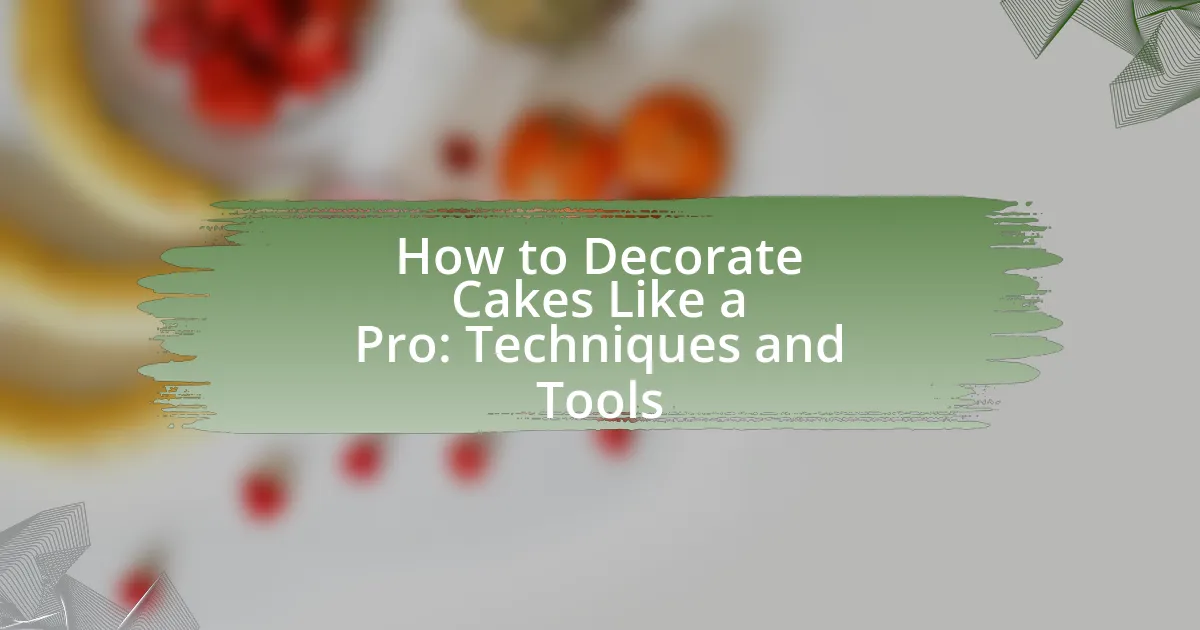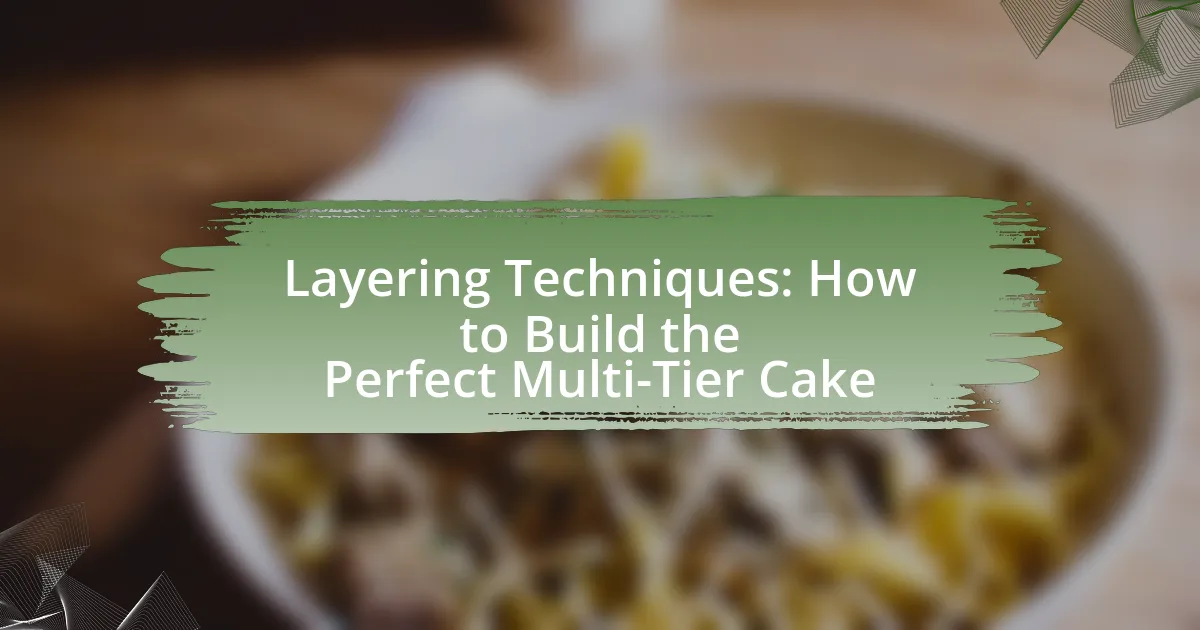Vegan cake recipes are dessert options that exclude all animal products, utilizing plant-based ingredients such as flour, sugar, fruits, and non-dairy milk. These recipes cater to dietary restrictions and align with ethical and environmental considerations, contributing to their growing popularity. The article explores the differences between vegan and traditional cakes, common ingredients, health benefits, and various types of vegan cakes suitable for different occasions. Additionally, it provides tips for successful baking, troubleshooting advice, and unique recipe ideas, ensuring that both vegans and non-vegans can enjoy delicious, plant-based desserts.
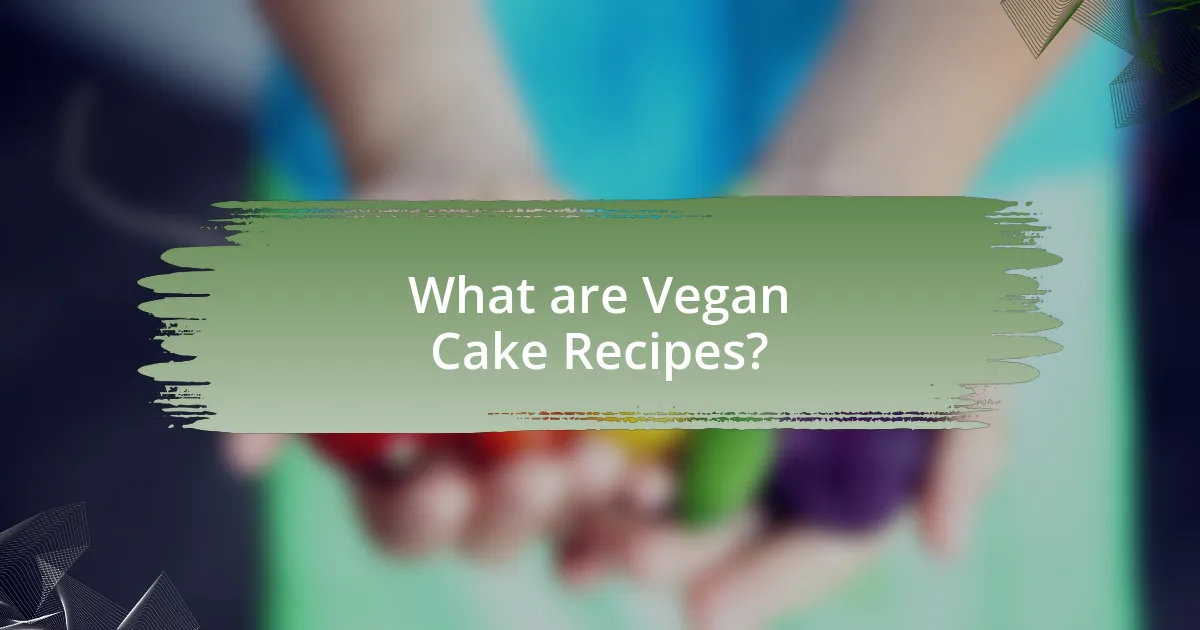
What are Vegan Cake Recipes?
Vegan cake recipes are dessert recipes that do not include any animal products, such as eggs, dairy, or honey. These recipes typically use plant-based ingredients like flour, sugar, fruits, vegetables, and non-dairy milk or yogurt to achieve texture and flavor. The use of alternatives like applesauce, flaxseed meal, or aquafaba often serves as substitutes for eggs, while coconut oil or almond milk can replace butter and dairy milk. The popularity of vegan cake recipes has surged due to the increasing demand for plant-based diets, with studies indicating that veganism has grown by 600% in the past three years.
How do Vegan Cake Recipes differ from traditional cake recipes?
Vegan cake recipes differ from traditional cake recipes primarily by omitting animal products such as eggs and dairy. Instead, vegan cakes utilize plant-based alternatives like applesauce, flaxseed meal, or aquafaba to replace eggs, and non-dairy milk or plant-based yogurt to substitute for dairy. This shift not only caters to dietary restrictions but also aligns with ethical and environmental considerations, as the production of plant-based ingredients typically has a lower carbon footprint compared to animal-derived products. Studies indicate that vegan diets can reduce greenhouse gas emissions by up to 70%, highlighting the environmental benefits of choosing vegan recipes.
What ingredients are commonly used in Vegan Cake Recipes?
Common ingredients used in vegan cake recipes include flour, sugar, plant-based milk, vegetable oil, baking powder, and vinegar. These ingredients replace traditional cake components, ensuring the cake remains moist and flavorful without animal products. For instance, plant-based milk such as almond or soy milk serves as a substitute for dairy milk, while vegetable oil provides the necessary fat content. Baking powder acts as a leavening agent, and vinegar can enhance the cake’s texture when combined with baking soda. This combination of ingredients allows for a wide variety of vegan cakes that are both delicious and suitable for those following a vegan diet.
How do substitutions affect the texture and flavor of vegan cakes?
Substitutions in vegan cakes significantly impact both texture and flavor. For instance, replacing eggs with flaxseed meal or applesauce can lead to a denser texture, as these ingredients provide moisture but lack the aeration that eggs offer. Additionally, using almond milk instead of dairy milk can impart a nuttier flavor, while coconut oil can enhance richness and moisture, contributing to a softer crumb. Research indicates that the choice of flour, such as using whole wheat instead of all-purpose, can also alter the cake’s density and chewiness, affecting overall mouthfeel. These substitutions are crucial for achieving desired outcomes in vegan baking, as they directly influence the sensory characteristics of the final product.
Why are Vegan Cake Recipes becoming popular?
Vegan cake recipes are becoming popular due to the increasing demand for plant-based diets and healthier dessert options. This trend is driven by a growing awareness of health benefits associated with veganism, such as lower cholesterol levels and reduced risk of chronic diseases. Additionally, the rise in environmental consciousness has led consumers to seek sustainable food choices, with plant-based ingredients having a lower carbon footprint compared to animal products. According to a report by the Plant Based Foods Association, the plant-based food market grew by 27% in 2020, indicating a significant shift in consumer preferences towards vegan options.
What health benefits are associated with vegan cakes?
Vegan cakes offer several health benefits, primarily due to their plant-based ingredients. These cakes are typically lower in saturated fats and cholesterol compared to traditional cakes, which can contribute to better heart health. Additionally, vegan cakes often contain more fiber from whole grains, fruits, and nuts, promoting digestive health and aiding in weight management. Research indicates that diets rich in plant-based foods can lower the risk of chronic diseases such as diabetes and certain cancers. For example, a study published in the Journal of the American College of Cardiology found that plant-based diets are associated with a reduced risk of heart disease.
How do Vegan Cake Recipes cater to dietary restrictions?
Vegan cake recipes cater to dietary restrictions by eliminating animal products, making them suitable for individuals with lactose intolerance, egg allergies, or those following a vegan lifestyle. These recipes often utilize plant-based substitutes such as applesauce, flaxseed meal, or almond milk, which provide moisture and binding properties without the use of dairy or eggs. Additionally, many vegan cake recipes can be easily adapted to accommodate gluten-free diets by substituting traditional flour with gluten-free alternatives like almond flour or coconut flour. This adaptability ensures that a wider range of dietary needs is met, allowing more people to enjoy delicious desserts without compromising their health requirements.
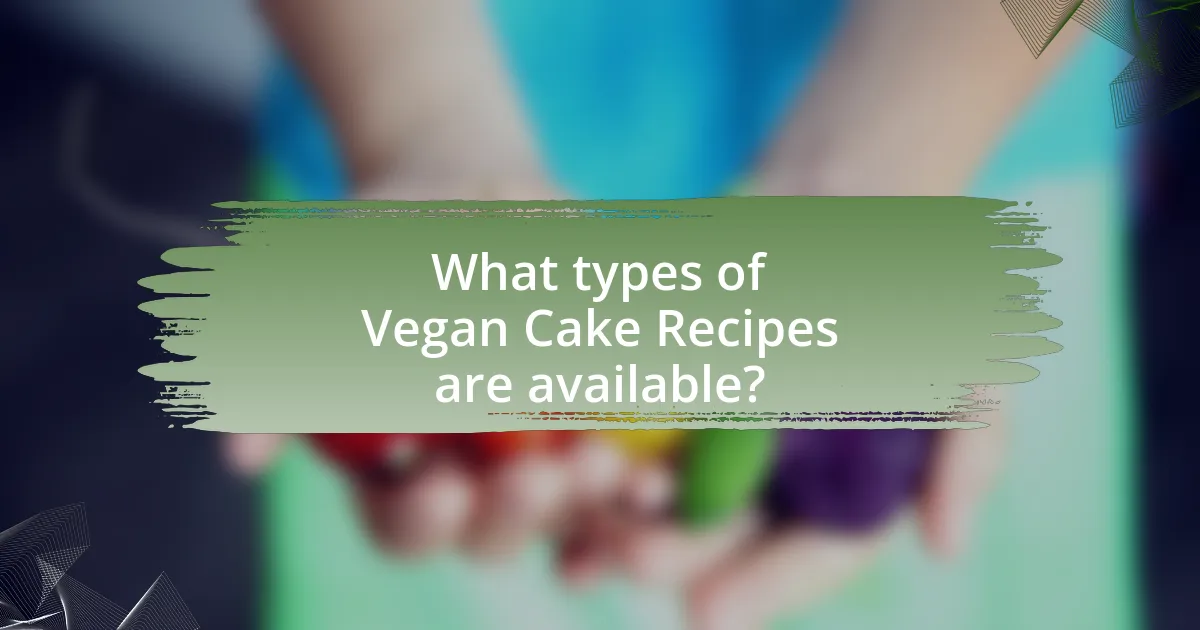
What types of Vegan Cake Recipes are available?
Various types of vegan cake recipes are available, including chocolate vegan cakes, vanilla vegan cakes, fruit-based vegan cakes, and nut-based vegan cakes. Chocolate vegan cakes often utilize cocoa powder and plant-based milk, while vanilla vegan cakes typically use vanilla extract and non-dairy butter. Fruit-based vegan cakes, such as carrot or banana cakes, incorporate fruits for moisture and flavor, and nut-based vegan cakes often include ground nuts or nut flours for texture and richness. These recipes cater to diverse tastes and dietary preferences, making them popular among both vegans and non-vegans alike.
How can you categorize Vegan Cake Recipes?
Vegan cake recipes can be categorized based on ingredients, flavor profiles, and preparation methods. For instance, they can be divided into categories such as fruit-based cakes, nut-based cakes, and chocolate cakes, which highlight the primary ingredients used. Additionally, flavor profiles can include categories like vanilla, citrus, and spice cakes, reflecting the taste experience. Preparation methods can further categorize recipes into baked cakes, no-bake cakes, and steamed cakes, showcasing the techniques employed. This classification helps in organizing recipes for easier navigation and selection based on dietary preferences and occasions.
What are the most popular flavors in Vegan Cake Recipes?
The most popular flavors in vegan cake recipes include chocolate, vanilla, lemon, and carrot. Chocolate is favored for its rich taste and versatility, often enhanced with ingredients like cocoa powder or dark chocolate. Vanilla remains a classic choice, providing a light and sweet base that pairs well with various add-ins. Lemon is appreciated for its refreshing zest, often used in cakes that require a bright flavor profile. Carrot cake is beloved for its moist texture and natural sweetness, frequently complemented by spices like cinnamon and nutmeg. These flavors are consistently highlighted in vegan baking communities and recipe collections, reflecting their widespread appeal.
Which occasions are best suited for different types of vegan cakes?
Different types of vegan cakes are best suited for various occasions, such as birthdays, weddings, and holidays. For birthdays, rich chocolate or funfetti vegan cakes are popular due to their celebratory nature and appeal to both children and adults. Weddings often call for elegant vegan cakes like vanilla or lemon, which can be beautifully decorated and serve as a centerpiece. During holidays, spiced cakes, such as pumpkin or gingerbread, resonate well with seasonal flavors and traditions. Each type of cake aligns with the occasion’s mood and preferences, ensuring that vegan options are inclusive and enjoyable for all guests.
What are some unique Vegan Cake Recipes to try?
Some unique vegan cake recipes to try include a Chocolate Avocado Cake, which uses ripe avocados for moisture and richness, and a Lemon Blueberry Olive Oil Cake, combining fresh blueberries with the fruity flavor of olive oil. Another option is a Carrot Pineapple Cake, blending grated carrots and crushed pineapple for a moist texture. Additionally, a Matcha Green Tea Cake offers a unique flavor profile with the health benefits of matcha. Each of these recipes showcases innovative ingredients that enhance flavor and texture while adhering to vegan principles.
How do you make a Vegan Chocolate Cake?
To make a Vegan Chocolate Cake, combine 1 ½ cups of flour, 1 cup of sugar, 1/3 cup of cocoa powder, 1 teaspoon of baking soda, and ½ teaspoon of salt in a bowl. Then, mix in 1 cup of almond milk, 1/3 cup of vegetable oil, 1 tablespoon of apple cider vinegar, and 1 teaspoon of vanilla extract until smooth. Pour the batter into a greased cake pan and bake at 350°F (175°C) for 30-35 minutes. This recipe is validated by its popularity in vegan baking communities, demonstrating that it yields a moist and flavorful cake without any animal products.
What ingredients are needed for a Vegan Carrot Cake?
A Vegan Carrot Cake requires flour, sugar, baking powder, baking soda, salt, ground cinnamon, grated carrots, plant-based milk, vegetable oil, and vanilla extract. These ingredients combine to create a moist and flavorful cake without any animal products. The use of grated carrots not only adds sweetness but also moisture, while plant-based milk and oil replace traditional dairy and fat sources, making the cake suitable for a vegan diet.
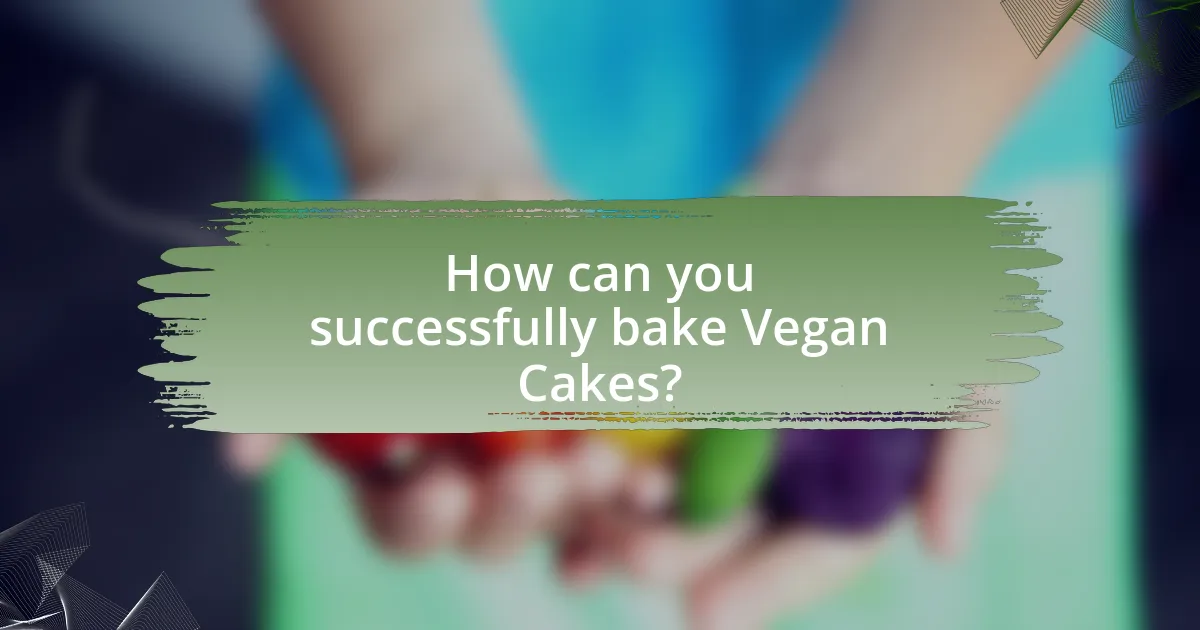
How can you successfully bake Vegan Cakes?
To successfully bake vegan cakes, use plant-based substitutes for eggs and dairy, such as flaxseed meal, applesauce, or almond milk. These ingredients provide moisture and binding properties essential for cake structure. For instance, one tablespoon of flaxseed meal mixed with three tablespoons of water can replace one egg, ensuring the cake rises properly. Additionally, incorporating baking soda and vinegar can enhance leavening, resulting in a light texture. Research indicates that vegan cakes can achieve similar taste and texture to traditional cakes when these substitutes are used effectively, making them enjoyable for all.
What tips should you follow for baking Vegan Cakes?
To bake vegan cakes successfully, use plant-based substitutes for eggs and dairy, such as flaxseed meal or applesauce for binding and moisture. These alternatives not only provide the necessary texture but also enhance the flavor profile of the cake. For instance, flaxseed meal mixed with water creates a gel-like consistency that mimics eggs, while applesauce adds sweetness and moisture. Additionally, ensure to use a combination of baking soda and vinegar to achieve the desired rise, as the reaction between these ingredients creates carbon dioxide, which helps the cake to rise. This method is supported by various vegan baking resources that emphasize the importance of these substitutions for achieving optimal results.
How do you ensure the right consistency in vegan cake batter?
To ensure the right consistency in vegan cake batter, use a combination of the correct ratios of wet and dry ingredients. The ideal vegan cake batter should be thick but pourable, resembling a smooth pancake batter. For instance, using a balance of flour, sugar, and plant-based milk, along with a binding agent like flaxseed meal or applesauce, helps achieve this texture. The moisture content from the plant-based milk and the binding agent is crucial; too much liquid can lead to a runny batter, while too little can result in a dry mixture. Adjusting these ingredients based on the specific recipe will help maintain the desired consistency.
What common mistakes should you avoid when baking vegan cakes?
When baking vegan cakes, avoid using the wrong type of flour, as it can affect texture and rise. All-purpose flour is typically best for vegan cakes, while whole wheat flour may lead to denser results. Additionally, neglecting to measure ingredients accurately can result in imbalanced flavors and textures; using a kitchen scale for precision is recommended. Another common mistake is not allowing the cake to cool properly before frosting, which can cause the frosting to melt and slide off. Lastly, failing to incorporate enough moisture, such as using applesauce or plant-based yogurt, can lead to dry cakes. These practices are essential for achieving a successful vegan cake.
What tools and equipment are essential for baking Vegan Cakes?
Essential tools and equipment for baking vegan cakes include mixing bowls, measuring cups and spoons, a whisk or electric mixer, a rubber spatula, a baking pan, parchment paper, and an oven. Mixing bowls are necessary for combining ingredients, while measuring cups and spoons ensure accurate ingredient quantities, which is crucial for baking success. A whisk or electric mixer aids in achieving the right texture, and a rubber spatula helps in folding ingredients without deflating the batter. A baking pan is required for shaping the cake, and parchment paper prevents sticking, ensuring easy removal. Finally, an oven is essential for baking the cake to perfection.
How do different baking pans affect the outcome of vegan cakes?
Different baking pans significantly affect the outcome of vegan cakes by influencing heat distribution, moisture retention, and texture. For instance, metal pans conduct heat more efficiently than glass or ceramic pans, leading to a quicker bake and potentially drier cakes if not monitored closely. Conversely, glass pans allow for slower, more even baking, which can help retain moisture but may require longer baking times. Additionally, the shape and size of the pan can alter the cake’s rise; for example, a wider pan results in a thinner cake that bakes faster, while a deeper pan may yield a denser texture. Research indicates that the material and design of baking pans can impact the final product’s crumb structure and overall quality, emphasizing the importance of selecting the right pan for desired cake characteristics.
What kitchen gadgets can simplify the vegan cake baking process?
Kitchen gadgets that can simplify the vegan cake baking process include a high-speed blender, a food processor, and a digital kitchen scale. A high-speed blender efficiently combines ingredients like nut butters and plant-based milks, ensuring a smooth batter. A food processor can quickly chop fruits or nuts, which are often used in vegan recipes, saving time and effort. A digital kitchen scale provides precise measurements, which is crucial for achieving the right texture and flavor in vegan cakes, as many recipes rely on accurate ingredient ratios. These tools enhance efficiency and consistency in the baking process.
What are some troubleshooting tips for Vegan Cake Recipes?
To troubleshoot vegan cake recipes, ensure accurate measurements of ingredients, as improper ratios can lead to texture issues. For instance, using too much flour can result in a dense cake, while too little can cause it to collapse. Additionally, check the freshness of your leavening agents; expired baking powder or baking soda can prevent the cake from rising properly. If the cake is too dry, consider adding more moisture through ingredients like applesauce or plant-based yogurt. Conversely, if the cake is too wet, reduce the liquid components or increase the dry ingredients. Lastly, monitor baking time and temperature closely, as vegan cakes may require adjustments compared to traditional recipes; an oven thermometer can help ensure accurate baking conditions.
How can you fix a vegan cake that is too dense?
To fix a vegan cake that is too dense, incorporate additional leavening agents such as baking powder or baking soda. These agents create air pockets in the batter, which lightens the texture. For instance, adding one teaspoon of baking powder per cup of flour can significantly improve the cake’s fluffiness. Additionally, consider increasing the liquid content by adding plant-based milk or applesauce, as moisture can help create a lighter crumb. Adjusting the mixing method by not overmixing the batter can also prevent density; overmixing develops gluten, which contributes to a denser texture.
What should you do if your vegan cake doesn’t rise properly?
If your vegan cake doesn’t rise properly, check the leavening agents used in the recipe. Vegan cakes typically rely on baking soda or baking powder for rising, so ensure they are fresh and properly measured. Additionally, verify that the liquid ingredients, such as plant-based milk or vinegar, are included in the correct proportions, as they react with the leavening agents to create lift. If the cake still fails to rise, consider increasing the oven temperature slightly, as a hotter environment can help the cake rise more effectively.
